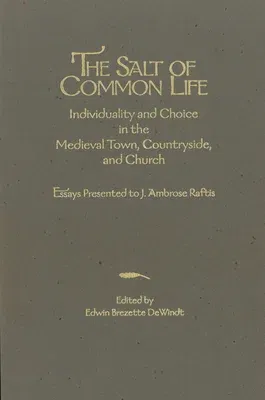The Salt of Common Life: Individuality and Choice in the Medieval Town, Countryside, and Church: Essays Presented to J. Ambrose RaftisHardcover, 1 July 1995

Qty
1
Turbo
Ships in 2 - 3 days
In Stock
Free Delivery
Cash on Delivery
15 Days
Free Returns
Secure Checkout

Part of Series
Studies in Medieval Culture (Medieval Inst. Publications)
Print Length
562 pages
Language
English
Publisher
Medieval Institute Publications
Date Published
1 Jul 1995
ISBN-10
187928846X
ISBN-13
9781879288461
Description
Product Details
Book Format:
Hardcover
Country of Origin:
GB
Date Published:
1 July 1995
ISBN-10:
187928846X
ISBN-13:
9781879288461
Language:
English
Location:
Kalamazoo
Pages:
562
Publisher:
Weight:
167.83 gm